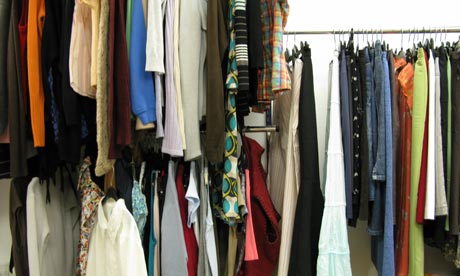With more than two-thirds of consumers willing to buy and wear pre-owned clothing such as jeans and jumpers, the report identifies additional opportunities for the clothing industry. The research also suggests that our obsession with disposable fashion may be on the wane. Only 21% of consumers say they consider the latest trends in fashion as influential when buying clothes, while they rank value for money as their top purchase criterion.
Clothing accounts for around 5% of the UK's total annual retail expenditure, with consumers spending £44bn a year on clothes - around £1,700 per household and second only to food and drink in terms of expenditure on consumable goods.
The report does not advocate that people should stop buying clothes, but that the active life of clothing is extended and the amount going into in landfill is cut back. Just under one-third of clothing at the end of its life goes to landfill every year - around 350,000 tonnes, worth £140m every year, based on Salvation Army estimates of their value.
Wrap said that extending the average life of clothes by just three months of active use per item would lead to a 5-10% reduction in their carbon and water footprints.
Liz Goodwin, chief executive officer of Wrap, said: "The way we make and use clothes consumes a huge amount of the Earth's precious resources, and accounts for a major chunk of family spending. But by increasing the active use of clothing by an extra nine months we could reduce the water, carbon, and waste impacts by up to 20-30% each and save £5bn."
The report cites the
recently launched M&S and Oxfam "Shwopping" initiative as evidence of retail awareness and customer interest in new approaches. Retailers are being urged to set up "buy back" schemes that would enable customers to sell retailer own-brand clothes they no longer want back to the retailer to prepare for re-sale.
Critics of Britain’s most photographed brunette say she’s “boring”. That she should be doing more to support a range of designers. That if she changed it up a little bit more, there would be more outfit copies flying off the shelves and “stimulating the economy”.
Personally, I love it when Kate repeats an outfit. She isn’t “just like us” but she is setting everyone an example – and even though she could chose to wear something new every single day, she makes her wardrobe work very hard.
The country is mired in recession and debt, yet every day high streets everywhere are filled with people spending money they don’t have on things they don’t need. If Kate is making people think twice before they punch in their Visa pin to buy the fourth dress for the fourth wedding of the season, I think she’s doing more financial good than all the times she’s caused a run on Reiss.
Kate exemplifies the difference between fashion and style. We’re never going to see her rocking a lobster fascinator or having an urban mod revivalist moment, but she dresses like a confident young woman who knows herself and understands what she feels comfortable in. This is another great advantage of outfit repetition. The more you wear a garment, the more you’re aware of how to move in it and how it makes you feel.
If you keep coming back to a dress or jacket that makes you happy when you put it on, then when you wear it, you’re letting your personality shine through. If you constantly dress in the newest and most fashionable outfits you can find without stopping to think about how they really make you feel, you’re not wearing clothes – you’re letting clothes wear you.
Kate’s decision to rewear and rework old favourites is also a huge compliment to the labels and designers she loves. British manufacturers are justly proud of their commitment to quality, and high end, high street pieces should be made to stand the test of time. I believe she’s leading a backlash against disposable fashion and promoting thoughtful purchasing. Repeating outfits is also a fashionable way to be environmentally conscious. No part of Kate’s well worn wardrobe is going to end up languishing in a landfill after a single wear.
If there weren’t people out there making weird, whimsical fashion choices, the world would be a poorer place. We need Marie Antoinettes, Prince Regents and Mark Francises to push boundaries and wear ludicrous trousers. But sometimes we need our style icons to be sensible too – and that’s why I think it’s great when Kate recycles.
So we should try to re wear our clothes and re think whether its necessary to buy new clothes when we have tons but I know must girls and ladies like new clothes it's just in our nature most of the time but we should try and limit ourselves!










